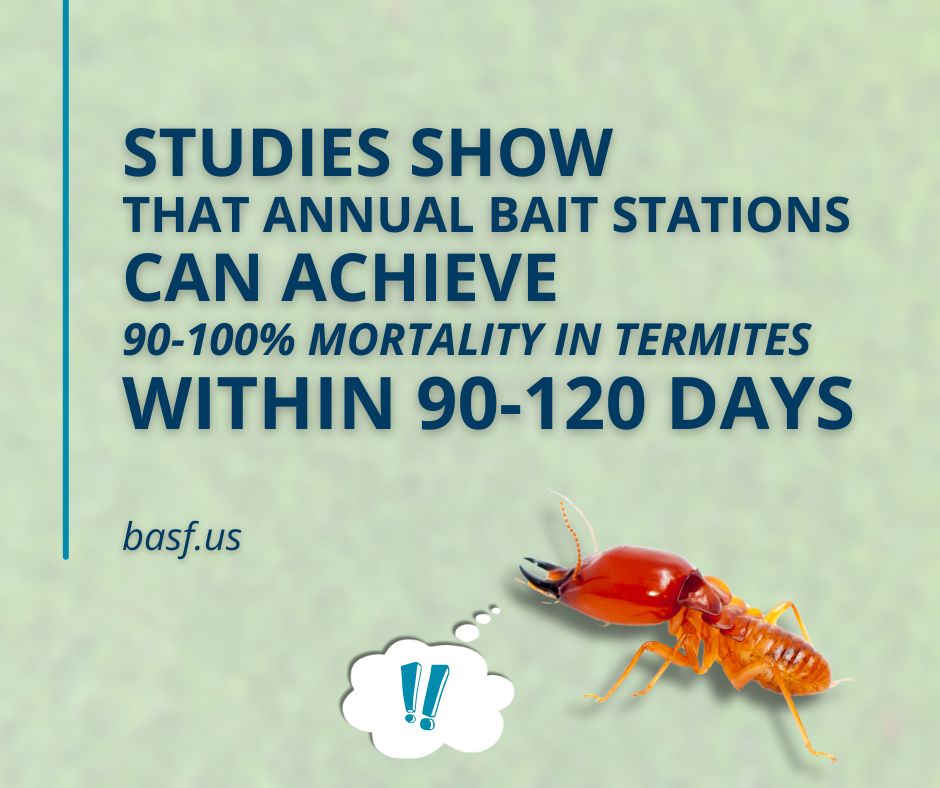In Charleston, termites aren’t just a seasonal pest. Thanks to the warm, humid climate, they can stay active all year long. That’s why termite prevention is more than a one-time job: it’s something that needs ongoing attention. Termite bait stations are one of the most effective tools for long-term protection.
When paired with professional annual monitoring, they help detect problems early and quietly protect your home from serious structural damage. If you’re wondering how these stations work, how they’re monitored, and what role you play as the homeowner, here’s what you need to know.
What Are Termite Bait Stations?
Bait stations are small, in-ground units that contain termite food mixed with a slow-acting active ingredient. When termites discover the bait, they carry it back to the colony, which helps reduce or eliminate the threat before it reaches your home.
Instead of creating a chemical barrier like traditional liquid treatments, bait stations work with termite behavior to intercept activity at the source. They’re simple, discreet, and highly effective when monitored correctly.
Professional technicians install bait stations around your home every 10 to 20 feet, depending on your yard layout and the level of termite pressure. Each unit is buried at soil level, so it won’t interfere with lawn care or daily activity.
Charleston homes tend to sit on moisture-rich soil, which makes careful placement especially important. At Precision, we install bait stations with local soil conditions in mind to make sure they’re working where termites are most active.

How Annual Monitoring Works
Annual monitoring is what keeps your bait system effective year after year. It ensures the stations stay intact, the bait remains active, and no early signs of termite activity go unnoticed.
What’s included in annual monitoring:
- A full inspection of every bait station
- Replacement of bait if consumed or damaged
- Documentation of termite activity (if any)
- Adjustments to station placement, if needed
- A professional review of current soil and moisture conditions
Even if there’s no visible termite activity during the visit, the data collected helps build a record of your home’s pest pressure over time.
This once-a-year service makes it easy to maintain protection without constant appointments or chemical treatments.
Why Less Is More
Unlike liquid treatments that often need to be reapplied or refreshed, termite bait stations are designed to work with very little disruption.
Annual monitoring keeps the process simple. You don’t need to schedule monthly visits or worry about constant reapplication. As long as the system is inspected by a professional once a year, it continues doing its job in the background.
Tips for Homeowners Between Visits
While the technician handles the inspection, you can help keep the system effective with a few small steps:
- Avoid covering stations with mulch or landscaping fabric
- Don’t dig or plant directly near the stations
- Watch for signs like mud tubes, shed wings, or wood that sounds hollow
- Let us know if you install irrigation, add new landscaping, or change the grade around your home
The less the stations are disturbed, the better they work.
Why Bait Systems Work Well
In our area, termites are active for most of the year. Heavy rainfall, soft soil, and warm temperatures make Charleston homes especially vulnerable.
Bait systems paired with annual monitoring offer steady, season-to-season protection. They’re also a great option for homeowners who prefer fewer chemicals and a lower-maintenance setup.
Some of the benefits include:
- Year-round defense with just one annual appointment
- No odors, trenching, or drilling
- Subtle appearance with minimal yard disruption
- Early detection without guesswork or over-treatment

How They Compare to Liquid Treatments
Liquid treatments form a chemical barrier around the home, while bait stations take a long-view approach by targeting the colony itself.
|
Feature |
Bait Stations with Annual Monitoring |
Liquid Barrier Treatments |
|
Target termite colonies |
Yes |
Not directly |
|
Maintenance required |
Once per year |
Reapplication every few years |
|
Chemical use |
Low |
Moderate to high |
|
Yard impact |
Minimal |
May involve trenching or drilling |
|
Best for |
Prevention and long-term control |
Immediate knockdown needs |
Many homeowners prefer bait stations because they combine simplicity with proven results.
When to Call a Professional
If you haven’t had a termite inspection in the last year, or if you’ve noticed warning signs like soft wood, bubbling paint, or mud tubes near your foundation, it’s time to take action.
At Precision Home and Pest Services, we can inspect your property, install a custom bait station system, and handle all future monitoring. Our annual plan gives you reliable protection without the stress of monthly treatments or complicated scheduling.
Conclusion
Termite bait stations are a low-maintenance, high-impact way to protect your home. When combined with annual monitoring, they quietly do the hard work of detecting and controlling termites before they become a bigger problem.
If you’re ready to set up long-term termite defense in Charleston, get in touch with Precision Home and Pest Services. We’ll help you choose the right solution and make sure it stays effective, year after year.


